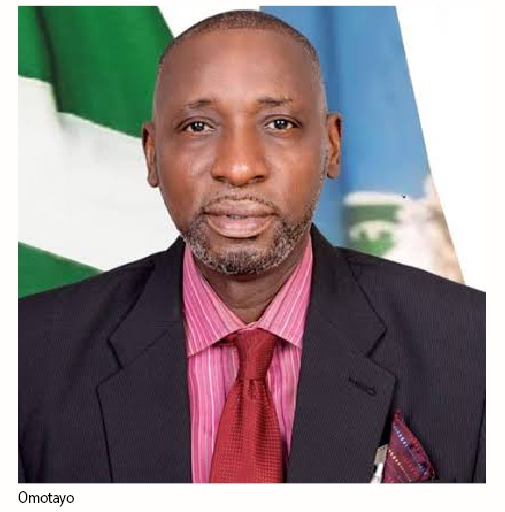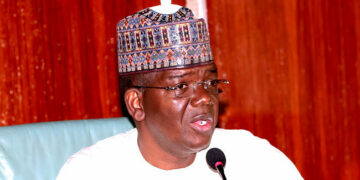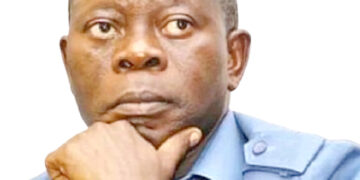Last week, Kuru the host community of the National Institute of Policy and Strategic Studies was agog following the graduation of 89 participants of Senior Executive Course SEC 44 of the nation think tank policy formulation institute.
The graduands were decorated with the institute insignia member of national institute (mni) by the former Inspector General of Police Mohammed D. Abubakar retd Chairman Alumni Association of the National Institute, AANI.
Indeed, the National Institute was established by former president Olusegun Obasanjo in 1979 and was conceived as a high-level institution with the primary objectives of serving as the nation’s foremost policy think-tank to develop a crop of top-class technocrats of high intellectual capacity, who will conceptualize and anchor the implementation of innovative and dynamic policy initiatives and strategies, critical for national development.
It also serves as a high-level Centre for reflection, research and dialogue where, academics of excellence, seasoned policy initiators and executors and other citizens of mature experience and wisdom drawn from all walks of life, meet to reflect and exchange ideas on the great issues of society, particularly as they relate to Nigeria and Africa within the context of a constantly changing world.
Besides, admission into the Senior Executive Course is by nomination and approval by the Board of Governors. The sponsoring organizations include the Civil Service (Federal and State), the Universities and other institutions of higher learning; the Armed Forces; para-military outfits; the organized private sector, like NACCIMA, MAN, NCWS, NLC, etc; and professional bodies, such as the Council of Registered Engineers of Nigeria (COREN); the Nigeria Medical Association (NMA); Nigeria Bar Association (NBA); Pharmaceutical Society of Nigeria (PSN); Institute of Chartered Accountants of Nigeria (ICAN), etc.
Since it inception abaut 43 years ago the National Institute has contributed immensely to national development as Nigeria’s apex policy think-tank, through numerous evidence-based policy recommendations as well as through constant, constructive engagement with policy makers at all levels, the dynamics of changing global environment underscore the need for the Institute to re-imagine its role and reposition itself for increased relevance in the policy arena.
It was against this background that the director general Prof Ayo Omotayo while speaking recently at a pre-graduation press briefing of SEC 44, said “I can tell you that in our library, in our archives, we have a very rich rapporteur of solutions and practical strategic things that can change the face of Nigeria.
He further said “One major thing I have found to be absent over time is the visibility of the institute at national dialogues. I also found out that there have been very poor policy uptakes.”
According to the DG when the federal government sends very high-level individuals here for reflections, engagements and research and they come up with solutions to the chosen national problems based on national priorities, it is expected that some of the things come up with should be adopted and used by the critical stakeholders.
He lamented that “ But you find out that most of those things rarely get out to where they should be and I feel this is one of the major things we should address.
Visibility is very key. We needed to reposition NIPSS and put it on the pedestal where whatever action, whatever activities that is going on here must be shown to the Nigerian public”
Prof. Omotayo pointed out that they have engaged in so many activities that are targeted at ensuring that critical stakeholders in Nigeria recognize that NIPSS has a lot to offer stressing that they will continue to push to make sure that their relevant is not subsumed under any guise.
He added that they want people to know that they are doing what they were set up to do, while also the structural transformation of NIPSS is critical, the Institute has been existing for over 40 years and they feel the need that a few things must change.
The DG further said the problems the country had faced when the military was leaving in 1979 are certainly different from the problems they have today in Nigeria stressing that there is a need to refocus and re-sharpen the tools by which they approach problems.
He added that the institute need to take up their game and of course upscale to ensure that they get a society that they envision pointing out that every solution to all Nigeria’s problems is in their archives and that they are going to ensure that once they put all the machinery in place, they will begin to push out these for the consumption of the public.
Prof Omotayo argued that one of the efforts being made so that their products don’t sit in the archives, they are talking to stakeholders, experts, consultants on the possibility of setting up a media outfit like a television station where they can have an outlet to push their agenda noting that the knowledge they produced in NIPSS is like prescription drugs.
“If people can sustain entertainment television, why can we not sustain a television station that focuses on policy and solving Nigeria’s problems. So that those who need the knowledge that we produce from here can easily get them without having to look through the books.’
Piqued by lack of political will to implement some of the recommendations of NIPSS, the North Central Coordinator of Civil Liberties Organisation CLO, Comrade Steve Aluko said it is regrettable that a Strategic institution like NIPSS is overwhelmed by lack of political will on the part of those in Government that set it up for Strategic reasoning to also relegated it to the background.
According to him, a lot of resources has gone into their training, a risk is taking in research work , traveling in and outside the country and at the end of the day their recommendations died on arrival is regrettable and is totally unacceptable.
He argued that the fact that is a Strategic think tank and reasoning is not meant for those on their eve of retirement rather it should be an essentially ingredients for those that still have meritable years of services so that whatever they learn will have been put into practice to enhance effectiveness and efficiency of State machinery .
Aluko further explained that the best Government can do is that if they know that they will not allowed the resourcesfullness to be put into practical use, it is not in the best interest for them to be continually engaged.
The CLO coordinator also noted the recent engagement with Mr president which according to him, is a laudable recomendation on local government autonomy and the rest of it, stressing that if government can do a public show and not implement the recommendations is an indictment on their part .
The human rights activist warned that government should have a rethink in their disposition to some of the recommendations, otherwise past and present administration will not be excused from the bad governance in Nigeria.
“If they have done this before now a lot of problems would have been nipped in the bud, like the issue of insecurity and lack of generation of resources which has been a major problem in the country.”
Aluko further challenged participants to reinvent the will based on what they have gained from other countries they have visited to put it into use or to have a way of mentoring others so that if government chose to be subservient or insensitive to the national need and and aspiration, they should even in their retirement do their very best to mentored other people who are favourable disposed to a new ideas and new thinking that will promote the unity and progress of this country.
Meanwhile, Vice President Yemi Osinbajo who is a guest speaker at the distinguished annual lecture, an event which preceded the graduation ceremony while speaking on the theme, ‘Subnational Local Governance in Africa: Rethinking Policies, Frameworks and Institutions called for the establishment of local government councils as democratic and autonomous units with better control over their own resources.
He sought for the strengthening of the subnational administrative units via an explicit further devolution of powers to be more explicit concerning the functions of each tier of government.
According to him, sub nationals must play a greater role in matters like security, health care and education.
Above all, he said they must also ensure that they have the right calibre of people elected, freely and fairly, into local administrative positions.
Osinbajo who was represented by the Minister of Labour and employment, Dr Chris Ngige, said, “We have an opportunity to strengthening local economies, driving healthy competition and fostering innovation.
We have an opportunity in this to better tackle the security challenges we are currently faced with.
“We have a better opportunity to allow the best and most qualified of us, across the States, across the Local Governments, to vie for political office and bring their talents and capacity to bear at this most crucial period in the history of our country.”
Similarly, in his remarks the Chairman of the distinguished annual lecture and the Emir of Kano, Alhaji Aminu Ado Bayero, said the national institute represents ideals of excellence and bedrock of national identity.
He pointed out that NIPSS provide intellectual engagement and ensure that no one is left behind in the development of the country, adding that the theme, ‘Subnational Local
Governance in Africa: Rethinking Policies, Frameworks and Institutions’, is appropriate and relevant, as it provides a platform to discuss national issues and the need to strengthened governance at the local level.
In the same vein, Plateau State governor Barr. Simon Lalong ably represented by the deputy governor Prof. Sonni Tyoden said he hope that the recommendation of Senior Executive Course SEC 44 will not be left on the shelves but will be circulated to all the state governments and local government councils in the country.
According to him, all the recommendations emanating from the national institute should go to where it will be effectively implemented for the benefit of Nigerians and for national development.
Besides, president Muhammadu Buhari in his address at the graduation ceremony of SEC 44 challenged them to bring the novel ideas they have acquired during their studies to bear in their duty posts for the growth and development of the country .
According to him, he is delighted to know that they are leaving the National Institute with a better understanding of our great country and better knowledge of issues and problem-solving skills to enable them take more responsibilities and perform optimally at their duty posts in the interest of our nation.
He also tasked management of NIPSS Kuru to strive to be or even surpass the best policy think-tank in the world adding that their effort at engaging the best brains on critical national issues hasn’t gone unnoticed.
“Your submissions on these issues have also proved to be very useful in resolving many issues and to determine solutions to several issues as well as your recommendations in chatting specific paths to achieving these solutions”.
He also pointed out that this is an integral aspect of the dreams of the founding fathers of the Institute as it is also an assignment in Which the institute has never failed no matter the challenges, not even In the era of COVID-19.
President Buhari then congratulate the national institute for being resiliently consistent with their mandate which is to evolve ideas, new techniques, skills, policies, and new directions to guide policymakers at the highest level.





